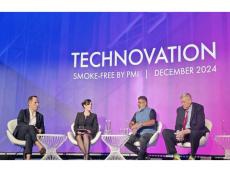Today.Az » Politics » Technovation 2024: Bold move towards smoke-free future
14 January 2025 [17:40] - Today.Az

The annual conference by Philip Morris
International (PMI), Technovation 2024, was held in Abu Dhabi, where the company presented its steps within the
framework of a smoke-free future strategy.
A smoke-free future is PMI's vision, under which the company has been
consistently implementing a phase-out approach to “traditional” tobacco
products for 10 years. The event brought together media and community leaders,
scientists, and activists to discuss the urgent need for innovation aimed at
reducing the harm caused by traditional cigarettes. The company clearly
articulated its mission: to create a world without cigarette smoke.
The urgency of these efforts is
underscored by shocking statistics. Smoking-related diseases claim
approximately 8 million lives annually, yet nearly 1.1 billion people worldwide
continue to smoke. PMI's response? An investment of $12.5 billion in scientific
research and product innovation over the past decade. These efforts have
yielded impressive results: as of the third quarter of 2024, smoke-free
products accounted for 38% of PMI's net revenue—representing 36.8 million
smoke-free product users across 92 countries!
PMI Chief Executive Officer, Jacek Olczak,
addressing the conference, outlined the company's ambitious goal of shifting
more than two-thirds of its revenue to smoke-free products by 2030.
“If you don't smoke, don't start. If you
smoke, quit. If you don't quit, switch to less harmful alternatives. Banning
alternatives to cigarettes is a waste of time. Science-based products offer a
faster path to reducing the harm caused by smoking,” he stressed.
At the core of PMI's smoke-free vision
lies its smoke-free products’ line. The company emphasizes these alternatives
to traditional cigarettes also because smoke-free products make a tangible
contribution to reducing smoking rates worldwide. For example, in Japan, the
smoking rate has decreased by 40 percent since the launch of PMI's smoke-free
products in 2014.
Stefano Volpetti, President of Smoke-Free
Inhalable Products and Chief Consumer Officer at PMI, highlighted the diversity
of the company's portfolio, which includes tobacco heating products, e-vapes
and oral nicotine pouches.
“Our goal is to offer a diverse menu of
science-based alternatives. The acquisition of Swedish Match in 2022 has
expanded our portfolio of smoke-free oral products, reinforcing our commitment
to harm reduction,” he added.
One of the main obstacles to achieving a
smoke-free future is public misunderstanding about nicotine. PMI executives
emphasized that while nicotine is addictive, it is not the primary cause of
smoking-related diseases. The major harm is caused by chemicals produced by
combustion.
“Combustion is the problem, not nicotine. Countries
such as Sweden and Japan have demonstrated the effectiveness of smoke-free
products in reducing smoking rates. However, uncoordinated global regulation is
slowing progress. How can we allow the sale of cigarettes while banning less
harmful alternatives? This is detrimental to public health,” Olczak stated.
The event also showcased smoking reduction
success stories from around the world. New Zealand plans to become a smoke-free
country by 2025 through progressive policies that support alternative products.
Similarly, smoking rates in Sweden have fallen to a record low of 5.3 percent
in the EU, aided by the widespread adoption of non-combustible products.
Frederic de Wilde, PMI's president for South
and Southeast Asia, CIS, and the Middle East, praised countries such as the
Philippines for promoting harm reduction.
“The Philippines has created separate
regulatory categories for smoke-free products, incentivizing their use through
favorable tax policies. This approach should be an example for other
countries,” he said.
Looking ahead, PMI remains firmly
committed to innovation. Tommaso Di Giovanni, PMI’s Vice President for International
Communications and Engagement, outlined the company's mission as a broader
community effort.
“Innovation is the driver of progress. Our
journey to smokefree products began in 2014, and with the support of
governments and civil society, we believe many countries can go smokefree within
the next 10-15 years,” he added.
The event also featured an exhibition of
PMI's smoke-free products, where participants could get hands-on experience
with technologies that could change the tobacco industry.
|